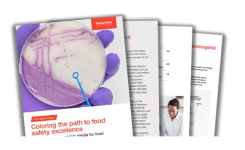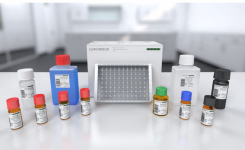Food Testing in Kazakhstan Helped by 14 RABIT Systems
go back to news archives| The Kazakhstan Ministry of Health has bought 14 RABIT systems from microbiology specialists Don Whitley Scientific for food testing in its public health laboratories. Widely accepted as the most versatile yet least expensive of all rapid bacterial detection methods, the Rapid Automated Bacterial lmpedance Technique (RABIT) system can be used in two different ways. The direct technique measures changes in the culture medium's electrical conductance due to the production of highly charged metabolites by target organisms. For species in which this does not occur, an indirect technique can be used to monitor the amount of carbon dioxide generated. |
| Users can specify the growth media required according to their needs, which in the Kazakhstan public health laboratories includes the rapid detection of anaerobes, gram negatives, Salmonella and Campylobacter species using 64-channel systems. The RABIT's modular design provides a flexible screening system that allows expansion of up to 512 channels without the need for additional hardware and software. |
Source : Don Whitley Scientific View Company Information
Posted on February 5, 2007
LATEST MICROBIOLOGY NEWS
-
AOAC Validated iQ-Check Vibrio PCR Kit
01 Apr 2025 -
AI-Powered Precision For Colony Counting
27 Mar 2025
MICROBIOLOGY EVENTS
-
Mycotoxin Detection and Analysis: Strategies to Support Your Testing Program
3 Apr 2025 -
15th Conference of The World Mycotoxin Forum® – WMFmeetsSalzburg
7 Apr 2025 -
Making The World’s Coffee Safer!
10 Apr 2025 -
ESCMID European Congress of Clinical Microbiology and Infectious Diseases
11 Apr 2025 -
IBQC 2025
14 Apr 2025 -
IFU Technical Workshop 2025
15 Apr 2025 -
Validation of Water Systems for Microbial Control
23 Apr 2025 -
USP Chapter <86> and the Move to Recombinant Methods
29 Apr 2025 -
Free Expert Webinar: Advancing Drinking Water Microbiology Testing Compliance & Efficiency
29 Apr 2025 -
British Society For Microbial Technology 40th Anniversary Microbiology Conference
15 May 2025
















